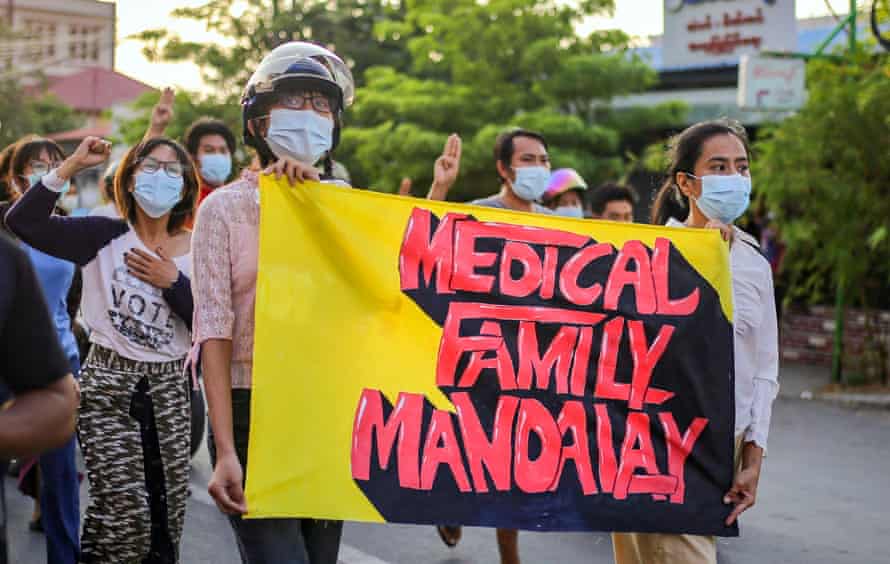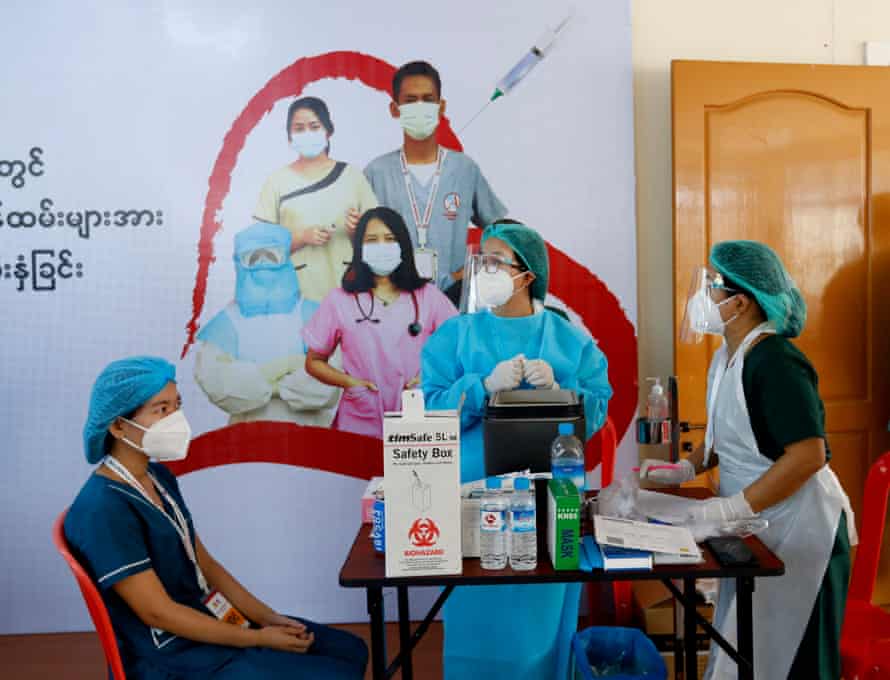Doctors in Myanmar have warned the country would be unable to cope with a major outbreak of Covid-19 as hospitals and medical facilities struggle to function in the aftermath of February’s military coup.
Fears are growing about the potential impact of a highly transmissible variant as neighbouring countries, chiefly India but also Thailand and Laos, battle record numbers of Covid cases.
Last year, more than 3,000 people in Myanmar died when the pandemic hit, with the UN warning the country was particularly vulnerable given its weak public health system.
But there are concerns a third wave could prove far more deadly because, since the military seized power earlier this year, most hospitals are not operational due to a strike by doctors and other medical workers.
The number of people being tested has plummeted and the vaccination programme has been thrown into confusion. The UN has warned that medics fear arrest or detention by the junta “at a time when Myanmar needs them the most”.
One doctor based in Yangon said a fresh outbreak would place extraordinary strain on the public healthcare system.
“I think it would be a disaster,” said the medic, who cannot be named for security reasons. “Even in [the] Covid second wave, the government had a shortage of human resources – doctors. That’s why many medics and volunteers helped us with everything. But now, most of the charity clinics’ doctors, medics and volunteers are being arrested by the junta.”
Another doctor, who also cannot be named, agreed: “This could become a perfect storm, and Myanmar is not in a position to respond. Even if the hospital situation normalises to pre-February levels, the capacity will be critically insufficient to deal with a large outbreak.”
A medic in Mandalay, Myanmar’s second biggest city, said she had treated about 20 Covid patients in recent months and believed the virus was circulating at a low level. “Fortunately it is not spreading massively,” she said.
She worries that health services would be unable to cope with an outbreak if new variants, such as the strain first detected in India, spread over the border.

Mandalay general hospital is barely functioning, and there is only one small charity facility capable of treating patients with severe Covid in the city, she said. It can handle about 20 patients, and equipment is basic. “Compared to the hospital, we have no HFNC [to give patients oxygen] and no patient monitors [which show vital signs],” she said, adding they have just oxygen cylinders and medicines.
A private hospital in the city is also capable of caring for patients who develop pneumonia, she said, but can accept only a very limited number of people, and the medical bills are unaffordable for most. “For the treatment cost you could buy a car,” she said.
Patients who test positive for Covid are referred to the military hospital for treatment, but are too afraid to go. She fears that she could be targeted by security forces for caring for patients outside of the military facility.
Alarmed by the possibility of a major new outbreak, the charity Medical Action Myanmar (Mam) has said it is raising funds for oxygen concentrators to treat patients. A Mam UK spokesperson said: “We are frightened of the impact that Covid will have on an already compromised population.”
According to the Myanmar ministry of health and sports, to date, the country has had more than 143,000 confirmed Covid cases and 3,216 deaths. However, as testing levels have fallen to a fraction of what they were before the coup it is impossible to know the true scale of infections.

Dr Khin Khin Gyi, speaking for the ministry, warned last month: “There is a possibility of a third wave of the pandemic coming.”
For the medics taking part in the Civil Disobedience Movement against the junta, which in turn has imposed a violent crackdown on protesters, the prospect of a health emergency during the strike brings much soul-searching.
“Yes, it is a very difficult decision,” said the doctor in Yangon. “The ethical and moral dilemma obviously.” But the surgeon said they would continue “until we win”.
“The unity among junior doctors, thinking about the brighter future if we have democracy, the creativity of generation Z and the resistance of the people (especially the poor ones) against the junta. I think those are the things that motivate me every day.
“There are people who died resisting the junta. This is the least I can do.”
This content first appear on the guardian
